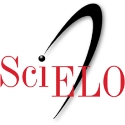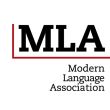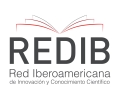Superhéroes en la península Ibérica. Identidad nacional, apropiación cultural e influencia estadounidense en la narrativa de la serie de cómics Ibéroes (2009-17), de Íñigo Aguirre y Javier Tartaglia.
Resumen
El estudio se centrará en el análisis e interpretación textual del cómic como manifestación artística, enfocándose particularmente en la adaptación a la idiosincrasia española de un modelo de producción cultural de claro cuño estadounidense que se ha universalizado para desarrollarse internacionalmente, como ocurre en España. Así, mediante esta apropiación y, a pesar de la fuerte influencia del país norteamericano, el texto no deja de ofrecer una obra genuinamente española, especialmente en el contenido, directamente asociado a la realidad peninsular que no deja de emerger entre la estructura aparentemente foránea.
Palabras clave
Texto completo:
PDFReferencias
Aguirre, Íñigo y Tartaglia, Javier (2012). Ibéroes. Madrid: Dolmen.
Babic, Annessa Ann (2013). “Introduction”. En Comics as History, Comics as Literature. Roles of the Comic Book in Scholarship, Society, and Entertainment. Lanham (ME): Fairleigh Dickinson University Press. 1-14.
Barker, Martin (1989). Comics: Ideology, Power and the Critics. Manchester: Manchester University Press.
Barthes, Roland (1977). Image, Music, Text. Nueva York: Hill and Wang Publishers.
Barthes, Roland (2012) 1957. Mythologies. Trad. de Howard, Richard y Lavers, Annete. Nueva York: Hill and Wang.
Bongco, Mila (2000). Reading Comics. Language, Culture, and the Concept of the Superhero in Comic Books. Nueva York: Garland Publishing.
Constenla, Tereixa (2017, 29 de julio). “El siglo de oro del cómic español: La explosión creativa de la novela gráfica conquista espacios antes vedados al tebeo”. En El País. Disponible en: https://elpais.com/cultura/2017/07/28/babelia/1501264717_520065.html
Di Paolo, Marc (2011). War, Politics and Superheroes. Ethics and Propaganda in Comics and Film. Jefferson (NC): McFarland and Co. Publishers.
Eco, Umberto y Chilton, Natalie (1972). “The Myth of Superman”. Diacritics, Vol. 2, No. 1, Spring. 14-22.
Eco, Umberto (1979a). A Theory of Semiotics. Bloomington: Indiana University Press.
Eco, Umberto (1979b). The Role of the Reader. Bloomington (IN): Indiana University Press.
Eco, Umberto (1990). The Limits of Interpretation. Bloomington (IN): University of Indiana Press.
Eisner, Will (1985). Cómics and Sequential Art. Tamarac (FL): Poorhouse Press.
Gasca, Luis y Gubern, Román (1988). El discurso del cómic. Madrid: Cátedra.
González del Pozo, Jorge (2014). “Ibéroes: Racismo y crítica social en la apropiación españolizada de la estética del superhéroe estadounidense”. Romance Studies, Vol. 32, 1, January. 40-56.
González del Pozo, Jorge (2015). “Neo-western español para el siglo XXI: Antiguas y lejanas historias narradas desde nuevas y cercanas perspectivas”. En Walsh, Anne (ed.). Telling Tales: The Place of Storytelling in Contemporary Spain. Cambridge: Cambridge Scholars Publishing. 57-75.
Hatfield, Charles (2005). Alternative Comics. An Emerging Literature. Jackson (MS): University of Mississippi Press.
Klock, Geoff (2006). How to Read Superhero Comics and Why. Nueva York: Continuum.
Knowles, Christopher (2007). Our Gods Wear Spandex. The Secret History of Comic Book Heroes. San Francisco: Weiser Books.
Kukkonen, Karyn (2013). Contemporary Cómics Storytelling. Lincoln (NE): University of Nebraska Press.
Matute, Fran G. (2017, 2 de abril). “Carlos Pacheco: El cómic de superhéroes tradicionalmente se ha dirigido hacia el lector onanista masculino, y eso está cambiando”. En Jot Down. Contemporary Culture Mag. Disponible en: https://www.jotdown.es/2017/08/carlos-pacheco-el-comic-de-superheroes-tradicionalmente-se-ha-dirigido-hacia-el-lector-onanista-masculino-y-esto-esta-cambiando/
McAllister, Matthew P., Sewell Jr., Edward H., y Gordon, Ian (2001). “Introducing Comics and Ideology”. En Comics & Ideology. Nueva York: Peter Lang. 1-14.
Mehren, Anna (2011). “Peculiarities in the Language of Superhero Comics: The Names of the Characters and Their Translation into Spanish”. En New Approaches to Specialized English Lexicology and Lexicography. Newcastle (UK): Cambridge Scholars. 153-173.
Moix, Terenci (2007). Historia social del cómic. Barcelona: Bruguera.
Ndalianis, Angela (2009). “Comic Book Superheros: An Introduction”. En The Contemporary Comic Book Superhero. Nueva York: Routledge. 3-15.
Riley, Brendan (2007). “Warren Ellis Is the Future of Superhero Comics: How to Write Superhero Stories That Aren’t Superhero Stories”. En Wandtke, Terrence R. (ed.) The Meaning of Superhero Comic Books. Jefferson (NC): McFarland and Co. Publishers. 129-148.
Round, Julia (2011). “Naturalising the fantastic: comics archetypes”. En Simmons, David (ed.) Investigating Heroes. Essays on Truth, Justice and Quality TV. Jefferson (NC): McFarland and Co. Publishers. 51-65.
Rueber, Micah (2013). “The Man with the Grey Metal Suit: Dr. Doom, the Fantastic Four, and the Costs of Conformity”. En Babic, Annessa Ann (ed.) Comics as History, Comics as Literature. Roles of the Comic Book in Scholarship, Society, and Entertainment. Lanham (ME): Fairleigh Dickinson University Press. 157-170.
Saunders, Ben (2011). Do the Gods Wear Capes? Spirituality, Fantasy, and Superheroes. London: Continuum.
Skordili, Beatrice (2013). “Logicomix and the Enunciatory Apparatus”. En Babic, Annessa Ann (ed.) Comics as History, Cómics as Literature. Roles of the Comic Book in Scholarship, Society, and Entertainment. Lanham (ME): Fairleigh Dickinson University Press. 209-230.
Smith, Matthew J. (2001). “The Tyranny of the Melting Pot Metaphor: Wonder Woman as an Americanized Immigrant”. En McAllister, Matthew P., Sewell Jr., Edward H., y Gordon, Ian (eds.) Comics & Ideology. Nueva York: Peter Lang. 129-150.
Van den Anker, Marinus J. J. y Verhoeven, Piet (2014). “Corporate communication: Analysing Marvel and DC”. Studies in Cómics, Vol. 5, No. l. 117-129.
Varnum, Robin y Gibbons, Christina T (2001). “Introduction”. En Varnum, Robin y Gibbons, Christina T. (eds.) The Language of Comics. Word and Image. Jackson (MS): University of Mississippi Press. vii-xvi.
Walton, Saige (2009). “Baroque Mutants in the 21st Century? Rethinking Genre Through the Superhero”. En Ndalianis, Angela (ed.) The Contemporary Comic Book Superhero. Nueva York: Routledge. 86-108.
Wandtke, Terrence R. (2012). The Meaning of Superhero Comic Books. Jefferson (NC): McFarland and Co. Publishers.
Enlaces refback
- No hay ningún enlace refback.
Copyright (c) 2019 CELEHIS : Revista del Centro de Letras Hispanoamericanas

Este obra está bajo una licencia de Creative Commons Reconocimiento-NoComercial-SinObraDerivada 4.0 Internacional.
 |
|
| La Dirección no se responsabiliza por las opiniones vertidas en los artículos firmados. Los derechos de reproducción o traducción de los artículos son reservados. Por correspondencia y/o canje dirigirse a: Departamento de Letras | Funes 3350 | (B7602AYL) Mar del Plata | Argentina | |
| |
Indizada en:
 |  |  |
|---|---|---|
 |  |  |
 |  |  |


